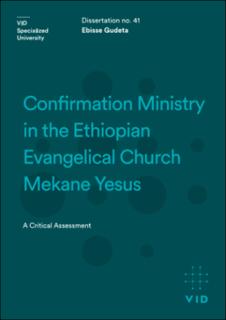| dc.contributor.author | Gudeta, Ebisse | |
| dc.coverage.spatial | Etiopia | en_US |
| dc.date.accessioned | 2022-12-21T16:32:09Z | |
| dc.date.available | 2022-12-21T16:32:09Z | |
| dc.date.issued | 2022 | |
| dc.identifier.isbn | 978-82-8456-011-3 | |
| dc.identifier.issn | 2535-3071 | |
| dc.identifier.uri | https://hdl.handle.net/11250/3039131 | |
| dc.description | Dissertation Submitted in Partial Fulfilment of the Requirements for the Degree of Philosophiae Doctor (Ph.D), VID Specialized University, Centre of Mission and Global Studies, Stavanger 2022 | en_US |
| dc.description.abstract | Anchored in the Great Commission (Matt. 28:19-20), teaching is one of the core functions of the Christian church. In the Ethiopian Evangelical Church Mekane Yesus (EECMY), confirmation ministry, which is the focus of my study, has the function of basic Christian education. It is a requirement for full voting and communicant membership in the church. The teaching ministry of congregations has traditionally been a sub-discipline under the overarching umbrella of Practical Theology. In line with recent developments in Practical Theology I make human experience, in this case the experience of confirmands and confirmation teachers, the starting point and focus of my enquiry. The core task of my thesis is: An investigation and critical assessment of contemporary confirmation ministry in two EECMY congregations.
The EECMY, established in 1959, has experienced rapid numerical growth in membership, and has at present (2020) more than ten million members. Because of the great growth confirmation classes are attended by huge numbers of confirmands. My findings show that the large number of confirmands is seen as a sign of God’s active blessing of congregational ministry. Many of the confirmands are grateful for the teaching. However, my research also reveals challenges that prevent confirmation ministry from fully serving its intended purpose. The large numbers of confirmands thwart attempts to personalize instruction or engage in active learning strategies. The pedagogical approach, basically the lecturing mode, a great diversity of age, along with varied educational and religious backgrounds, complicate the educational situation. A shortage of qualified teachers and the lack of a standardized curriculum have led congregations to develop ad-hoc strategies for confirmation instruction. These issues combine to present a real threat to the passing-on of the core theological convictions of the EECMY to the next generation of church members. As a result, confirmation ministry is encountering limitations in serving its purpose.
My findings are eye-openers to understanding the dynamics between membership growth and membership management, which undoubtedly ought to alert the EECMY to reflect critically on its current practice of confirmation ministry. | en_US |
| dc.language.iso | eng | en_US |
| dc.publisher | VID vitenskapelige høgskole, Stavanger | en_US |
| dc.relation.ispartofseries | Dissertation series for the Degree of Philosophiae Doctor (Ph.D.) at VID Specialized University;41 | |
| dc.subject | Ethiopia | en_US |
| dc.subject | confirmation | en_US |
| dc.subject | Ethiopian Evangelical Church Mekane Yesus | en_US |
| dc.subject | Mekane Yesus-kirken | en_US |
| dc.subject | konfirmasjon | en_US |
| dc.subject | Etiopia | en_US |
| dc.title | Confirmation ministry in the Ethiopian Evangelical Church Mekane Yesus : A Critical Assessment | en_US |
| dc.type | Doctoral thesis | en_US |
| dc.description.version | submittedVersion | en_US |
| dc.rights.holder | All rights reserved. No part of this publication may be reproduced or transmitted, in any form or by any means, without permission. | en_US |
| dc.subject.nsi | VDP::Humaniora: 000::Teologi og religionsvitenskap: 150 | en_US |
| dc.source.pagenumber | 251 | en_US |
